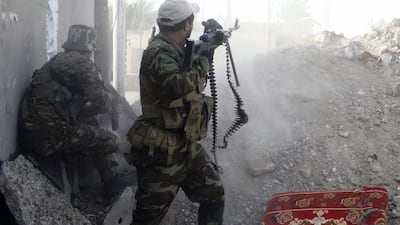Iraq exists only as an idea, not a nation. This view, expressed this week by Washington Post columnist Fareed Zakaria, has been expressed off and on over the past century. The idea that the unruly Iraqis require a firm hand to rule them was a tenet of attempted British rule in post-Ottoman Iraq, and has been revived periodically, usually by outsiders facing difficulty in ruling Iraq. It is, unsurprisingly, a profoundly racist view.
Zakaria doesn’t mean it in precisely the same sense. In his column, he writes that “nobody is willing to fight for Iraq. The problem really is not that Iraq’s army has collapsed. It’s that Iraq has collapsed”.
But Zakaria is wrong. The tribalism of Iraq’s army is a persistent lie, founded on self-serving logic. Soldiers and armies are made, not born. They do not appear out of nowhere. The failures of the Iraqi army today are not the failures of the Iraqi people for ever.
The line of reasoning that posits that Iraq’s army is sectarian because the Iraqis are themselves sectarian (and inherently so) fits into the same vein of argument as the idea, so often mooted after the 2003 invasion went wrong, that Iraqis did not “want” democracy.
______________________________________________________________
Read and watch more about America’s role in the Middle East:
■ America already tried imperialism in the Middle East – and it failed
■ Watch Faisal Al Yafai on The Middle East's new world order
______________________________________________________________
So much of that analysis appears to me to be the writing of stenographers to power; they all, one way or another, seek to justify, exonerate or excuse the missteps, mistakes and failures of the powerful, rather than seek a genuine understanding. If the Iraqi army is failing, this argument runs, it cannot be because of politics and the decisions of the powerful. It must be because of the natives.
But the current chaos in Iraq has clear political roots. It was made, not born, by injudicious political decisions and will only be solved by wiser ones.
Iraq at the start of this century was a complex, modern society. Shattering it, as the US did in 2003, was always going to have far-reaching consequences – repercussions that the US was simply unable to foresee and unable to plan for.
Even those things they were able to foresee, the known knowns, were ignored. Tossing out thousands of experienced and educated military men and women – with knowledge of how to find and use weapons – was always a bad idea. Without de-Ba’athification, there are good reasons to believe the insurgency against the US would not have been so powerful and ISIL would not have been able to take shape.
Couple that internal Iraqi issue with the complications of geography – Iran next door, nervous at having US forces east and west, Syria on the other side, concerned that the Assad regime would be next – and what was a foolish political decision begat a generation of violence.
ISIL is not, or not only, as Zakaria describes it, an insurgency against the governments of Iraq and Syria. It is, in fact, an insurgency by one group of Iraqis against another – indeed by one group of Iraqi military leaders against another.
Strip away the powerful recruiting narrative of religion and politics and ISIL is mainly an attempt by Sunni Saddamists to reclaim their rule over Baghdad. And it is due to entirely political reasons that they have come so close to doing so.
The sectarianism of Iraq’s army today has nothing to do with any inherent sectarianism in Iraqi society itself. Rather, it is entirely a result of deliberate sectarian policies and how the army was built and staffed from the mid-2000s, especially during the tenure of Nouri Al Maliki as prime minister.
It was Mr Al Maliki who oversaw the disarming of Sunni militias but not their Shia counterparts. It was Mr Al Maliki who, after the “awakening” of Sunni fighters successfully fought Al Qaeda in Iraq, then turned his government against them, refusing to pay the majority of them or integrate them into the regular security services.
And it was under Mr Al Maliki’s watch that the Iraqi army ceased to be an army for all Iraq and instead was systematically culled of senior Sunni leadership. Mr Al Maliki did not want a genuine Iraqi army; he wanted a militia with a sectarian hue.
What we are witnessing in Iraq today is the end result of bad political decisions. The sectarianism has been made; it was not born in the hearts of Iraqis. The Shia officers are no more inherently sectarian than their disenfranchised Sunni counterparts – but they are operating in a rotten system.
Armies are built. The US, for example, has built a modern army out of a variety of people, with different religions, ethnicities and even languages.
It is the institutions that mould soldiers and make armies. If the Iraqi army and militias today fight for their sect first and their flag second, that is not a deficiency of the soldiers or a sectarianism of the heart – it is the direct result of political decisions and a failure of leadership and institutions. Tribalism and sectarianism are not the natural state of Iraq.
falyafai@thenational.ae
On Twitter: @FaisalAlYafai


